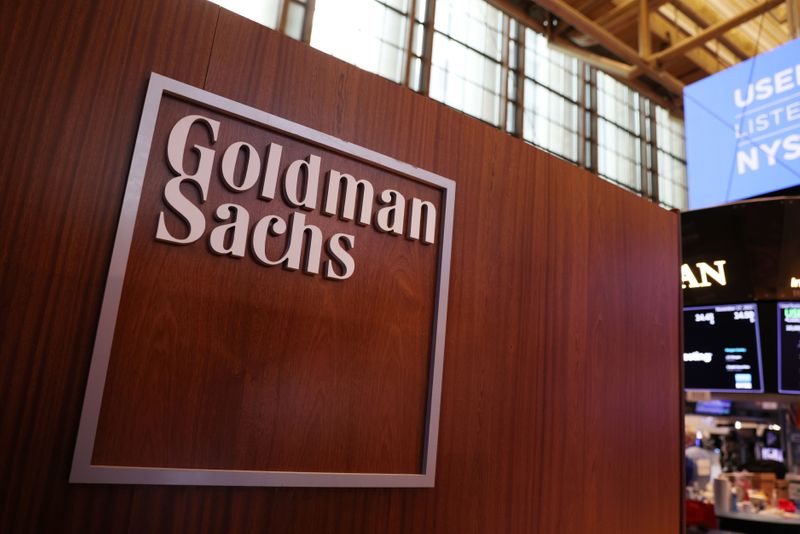Investing.com -- Goldman Sachs is on deck to release quarterly earnings that, some analysts fear, could be among the worst in the banking giant's history. Electric carmaker Tesla and streaming group Netflix will also deliver results after the bell. Elsewhere, Microsoft announces the price of its new generative artificial intelligence service in its productivity software.
1. Goldman Sachs to round out bank earnings
Goldman Sachs (NYSE:GS) is set to unveil its latest returns on Wednesday, with some investors bracing for the Wall Street powerhouse to potentially report one of its weakest quarters ever.
A slowdown in stock and bond trading, as well as an expected drop in lucrative investment banking fees, are projected to have weighed heavily on Goldman over the last three months.
Recent results from the banking giant's closest rivals point to the impact of the dearth in dealmaking. On Tuesday, Goldman peer Morgan Stanley's (NYSE:MS) second quarter revenue from sales and trading slipped by more than a fifth.
But analysts worry that Goldman faces other issues; namely, an anticipated write-down worth several hundred million dollars from its sale of home improvement lending group GreenSky, and losses on its consumer and real estate loan portfolios.
Chief executive David Solomon and other members of Goldman's management team have already flagged that this will be a challenging quarter. But just how bad it will be remains uncertain.
2. Tesla and Netflix ahead
Tesla (NASDAQ:TSLA) and Netflix (NASDAQ:NFLX) are also among the biggest businesses on tap to report results Wednesday as the parade of second quarter earnings gathers speed.
For Tesla, the focus will likely center around the EV giant's gross margin, which analysts expect will slump to a "trough" following a series of price cuts aimed at boosting volumes and countering intensifying competition.
Tesla shares, however, have surged over the past three months thanks to solid delivery numbers and charging deals with legacy automakers like GM (NYSE:GM) and Ford (NYSE:F). The stock has also been swept up in the enthusiasm around companies with exposure to artificial intelligence (AI).
Meanwhile, investors are curious to see how Netflix has fared after it launched a drive in May to crack down on password sharing between users. According to data from streaming analytics company Antenna cited by the Wall Street Journal, the number of new sign-ups in the U.S. between May 25 and 28 hit its highest level over a four-day period since Antenna first began compiling the figures. However, cancelations increased in June, per Antenna.
Observers are also keen to see if Netflix has any comments around the ongoing strike by Hollywood's writers and actors. Co-chief executive Ted Sarandos said in May that, even if these labor actions come to pass, Netflix can still rely on a "robust" slate of upcoming content.
Both Tesla and Netflix are scheduled to report after the close of U.S. trading.
3. Futures hover near flatline
U.S. stock futures ticked up on Wednesday, but stayed mostly around the flatline, as traders looked ahead to another busy earnings day.
At 05:04 ET (09:04 GMT), the Dow futures contract added 54 points or 0.15%, S&P 500 futures rose by 2 point or 0.05%, and Nasdaq 100 futures increased by 13 points or 0.08%.
The Dow Jones Industrial Average is coming off its seventh consecutive positive session, while the benchmark S&P 500 and the tech-heavy Nasdaq Composite also rose. The main indices jumped to their best close since April 2022.
More than 80% of the 38 companies in the S&P 500 that have posted results have delivered earnings beats, CNBC reported, citing FactSet data. Coupled with last week's slower-than-anticipated inflation data, the solid earnings could help bolster the case that the U.S. economy may be able to avoid a sharp downturn despite an unprecedented series of interest rate hikes by the Federal Reserve.
4. Microsoft closes at record high
Microsoft (NASDAQ:MSFT) shares notched their highest close on record Tuesday after the software behemoth announced the pricing of its suite of AI tools.
The Redmond, Washington-based tech group said it would charge $30 per month for access to its generative AI features in its uber-popular productivity services like Microsoft 365.
Analysts projected that the move, which would slap a large premium on top of the average monthly cost paid by Microsoft 365 customers, could lead to a significant boost in revenues. In a note, Wedbush analysts said they were “very bullish for the total addressable cloud AI market opportunity for Microsoft that could increase cloud revenue annually by 20% by 2025[.]"
Chief executive Satya Nadella defended the hefty price tag, saying in an interview with the Financial Times that the new AI features are "the same class of value" as its other ubiquitous applications like Word, Excel, and Teams.
5. Oil inches up amid supply constraints, demand worries
Crude prices edged higher Wednesday with traders eyeing supply strains, concerns over U.S. demand, and promises by China's government to take measures to reinvigorate the country's sputtering post-pandemic recovery.
At 05:03 ET, the U.S. crude futures moved up by 0.56% to $76.08 a barrel, while the Brent contract gained 0.72% to $80.20 per barrel.
On the supply side, data from the industry body American Petroleum Institute on Tuesday showed that U.S. crude stockpiles fell about 0.8 million barrels last week, after a substantially bigger-than-expected build in the prior week. Government figures from the Energy Information Administration are due later in the session.
The Federal Reserve is widely projected to increase borrowing costs by a further 25 basis points this month, according to Investing.com's Fed Rate Monitor Tool. The decision could weigh on demand in the U.S., the world's largest oil consumer.
Meanwhile, China, the world's second-biggest economy and top oil importer, barely grew in the second quarter. But Beijing has pledged to introduce new policies to "restore and expand" consumption in the country, which could give some lift to oil demand.
